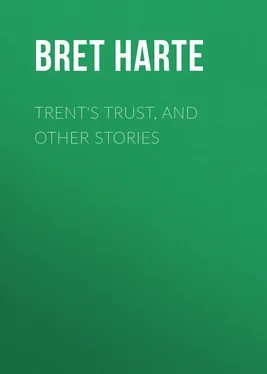Bret Harte - Trent's Trust, and Other Stories
Здесь есть возможность читать онлайн «Bret Harte - Trent's Trust, and Other Stories» — ознакомительный отрывок электронной книги совершенно бесплатно, а после прочтения отрывка купить полную версию. В некоторых случаях можно слушать аудио, скачать через торрент в формате fb2 и присутствует краткое содержание. Издательство: Иностранный паблик, Жанр: foreign_sf, literature_19, foreign_antique, foreign_prose, на английском языке. Описание произведения, (предисловие) а так же отзывы посетителей доступны на портале библиотеки ЛибКат.
- Название:Trent's Trust, and Other Stories
- Автор:
- Издательство:Иностранный паблик
- Жанр:
- Год:неизвестен
- ISBN:нет данных
- Рейтинг книги:5 / 5. Голосов: 1
-
Избранное:Добавить в избранное
- Отзывы:
-
Ваша оценка:
- 100
- 1
- 2
- 3
- 4
- 5
Trent's Trust, and Other Stories: краткое содержание, описание и аннотация
Предлагаем к чтению аннотацию, описание, краткое содержание или предисловие (зависит от того, что написал сам автор книги «Trent's Trust, and Other Stories»). Если вы не нашли необходимую информацию о книге — напишите в комментариях, мы постараемся отыскать её.
Trent's Trust, and Other Stories — читать онлайн ознакомительный отрывок
Ниже представлен текст книги, разбитый по страницам. Система сохранения места последней прочитанной страницы, позволяет с удобством читать онлайн бесплатно книгу «Trent's Trust, and Other Stories», без необходимости каждый раз заново искать на чём Вы остановились. Поставьте закладку, и сможете в любой момент перейти на страницу, на которой закончили чтение.
Интервал:
Закладка:
He went back to his room a very hopeful, foolish, but happy youth. As he entered he seemed to feel the charm of her presence again in the humble apartment she had sanctified. The furniture she had moved with her own little hands, the bed on which she had sat for a half moment, was glorified to his youthful fancy. And even that magic portmanteau which had brought him all this happiness, that, too,—but he gave a sudden start. The closet door, which he had shut as he went out, was unlocked and open, the portmanteau—his “trust”—gone!
III
Randolph Trent’s consternation at the loss of the portmanteau was partly superstitious. For, although it was easy to make up the small sum taken, and the papers were safe in Miss Avondale’s possession, yet this displacement of the only link between him and his missing benefactor, and the mystery of its disappearance, raised all his old doubts and suspicions. A vague uneasiness, a still more vague sense of some remissness on his own part, possessed him.
That the portmanteau was taken from his room during his absence with Miss Avondale that afternoon was evident. The door had been opened by a skeleton key, and as the building was deserted on Sunday, there had been no chance of interference with the thief. If mere booty had been his object, the purse would have satisfied him without his burdening himself with a portmanteau which might be identified. Nothing else in the room had been disturbed. The thief must have had some cognizance of its location, and have kept some espionage over Randolph’s movements—a circumstance which added to the mystery and his disquiet. He placed a description of his loss with the police authorities, but their only idea of recovering it was by leaving that description with pawnbrokers and second-hand dealers, a proceeding that Randolph instinctively felt was in vain.
A singular but instinctive reluctance to inform Miss Avondale of his loss kept him from calling upon her for the first few days. When he did, she seemed concerned at the news, although far from participating in his superstition or his suspicions.
“You still have the letter and photograph—whatever they may be worth—for identification,” she said dryly, “although Bobby cannot remember about the letter. He thinks he went once with his father to a photographer and had a picture taken, but he cannot remember seeing it afterward.” She was holding them in her hand, and Randolph almost mechanically took them from her and put them in his pocket. He would not, perhaps, have noticed his own brusqueness had she not looked a little surprised, and, he thought, annoyed. “Are you quite sure you won’t lose them?” she said gently. “Perhaps I had better keep them for you.”
“I shall seal them up and put them in the bank safe,” he said quickly. He could not tell whether his sudden resolution was an instinct or the obstinacy that often comes to an awkward man. “But,” he added, coloring, “I shall always regret the loss of the portmanteau, for it was the means of bringing us together.”
“I thought it was the umbrella,” said Miss Avondale dryly.
She had once before halted him on the perilous edge of sentiment by a similar cynicism, but this time it cut him deeply. For he could not be blind to the fact that she treated him like a mere boy, and in dispelling the illusions of his instincts and beliefs seemed as if intent upon dispelling his illusions of HER; and in her half-smiling abstraction he read only the well-bred toleration of one who is beginning to be bored. He made his excuses early and went home. Nevertheless, although regretting he had not left her the letter and photograph, he deposited them in the bank safe the next day, and tried to feel that he had vindicated his character for grown-up wisdom.
Then, in his conflicting emotions, he punished himself, after the fashion of youth, by avoiding the beloved one’s presence for several days. He did this in the belief that it would enable him to make up his mind whether to reveal his real feelings to her, and perhaps there was the more alluring hope that his absence might provoke some manifestations of sentiment on her part. But she made no sign. And then came a reaction in his feelings, with a heightened sense of loyalty to his benefactor. For, freed of any illusion or youthful fancy now, a purely unselfish gratitude to the unknown man filled his heart. In the lapse of his sentiment he clung the more closely to this one honest romance of his life.
One afternoon, at the close of business, he was a little astonished to receive a message from Mr. Dingwall, the deputy manager, that he wished to see him in his private office. He was still more astonished when Mr. Dingwall, after offering him a chair, stood up with his hands under his coat tails before the fireplace, and, with a hesitancy half reserved, half courteous, but wholly English, said,—
“I—er—would be glad, Mr. Trent, if you would—er—give me the pleasure of your company at dinner to-morrow.”
Randolph, still amazed, stammered his acceptance.
“There will be—er—a young lady in whom you were—er—interested some time ago. Er—Miss Avondale.”
Randolph, feeling he was coloring, and uncertain whether he should speak of having met her since, contented himself with expressing his delight.
“In fact,” continued Mr. Dingwall, clearing his throat as if he were also clearing his conscience of a tremendous secret, “she—er—mentioned your name. There is Sir William Dornton coming also. Sir William has recently succeeded his elder brother, who—er—it seems, was the gentleman you were inquiring about when you first came here, and who, it is now ascertained, was drowned in the bay a few months ago. In fact—er—it is probable that you were the last one who saw him alive. I thought I would tell you,” continued Mr. Dingwall, settling his chin more comfortably in his checked cravat, “in case Sir William should speak of him to you.”
Randolph was staggered. The abrupt revelation of his benefactor’s name and fate, casually coupled with an invitation to dinner, shocked and confounded him. Perhaps Mr. Dingwall noticed it and misunderstood the cause, for he added in parenthetical explanation: “Yes, the man whose portmanteau you took charge of is dead; but you did your duty, Mr. Trent, in the matter, although the recovery of the portmanteau was unessential to the case.”
“Dead,” repeated Randolph, scarcely heeding him. “But is it true? Are they sure?”
Mr. Dingwall elevated his eyebrows. “The large property at stake of course rendered the most satisfactory proofs of it necessary. His father had died only a month previous, and of course they were seeking the presumptive heir, the so-called ‘Captain John Dornton’—your man—when they made the discovery of his death.”
Randolph thought of the strange body at the wharf, of the coroner’s vague verdict, and was unconvinced. “But,” he said impulsively, “there was a child.” He checked himself as he remembered this was one of Miss Avondale’s confidences to him.
“Ah—Miss Avondale has spoken of a child?” said Mr. Dingwall dryly.
“I saw her with one which she said was Captain Dornton’s, which had been left in her care after the death of his wife,” said Randolph in hurried explanation.
“John Dornton had no WIFE,” said Mr. Dingwall severely. “The boy is a natural son. Captain John lived a wild, rough, and—er—an eccentric life.”
“I thought—I understood from Miss Avondale that he was married,” stammered the young man.
“In your rather slight acquaintance with that young lady I should imagine she would have had some delicacy in telling you otherwise,” returned Mr. Dingwall primly.
Randolph felt the truth of this, and was momentarily embarrassed. Yet he lingered.
Читать дальшеИнтервал:
Закладка:
Похожие книги на «Trent's Trust, and Other Stories»
Представляем Вашему вниманию похожие книги на «Trent's Trust, and Other Stories» списком для выбора. Мы отобрали схожую по названию и смыслу литературу в надежде предоставить читателям больше вариантов отыскать новые, интересные, ещё непрочитанные произведения.
Обсуждение, отзывы о книге «Trent's Trust, and Other Stories» и просто собственные мнения читателей. Оставьте ваши комментарии, напишите, что Вы думаете о произведении, его смысле или главных героях. Укажите что конкретно понравилось, а что нет, и почему Вы так считаете.












